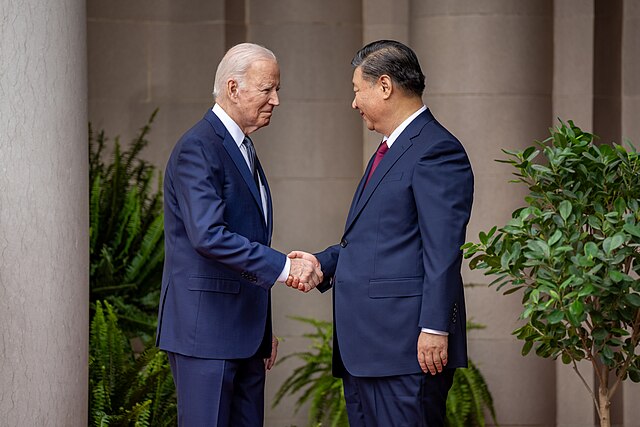
China’s leader Xi Jinping and U.S. President Joe Biden met outside of San Francisco on Wednesday, at the historic Filoli estate. The Biden-Xi meeting, which took place before the annual Asia Pacific Economic Cooperation (APEC) forum, was the first time in a year the two leaders had talked face to face. Expectations for agreements coming out of the summit are modest. But the meeting itself provides some measure of stability to a vital bilateral relationship at a time when multiple international conflicts are raging.
After the last Biden-Xi meeting, balloons spoiled the party
The leaders’ November 2022 meeting in balmy Bali, Indonesia, had also attempted to establish a stable floor under a bilateral relationship that had deteriorated into worrying tensions, especially surrounding an August 2022 trip to Taiwan by former Speaker Nancy Pelosi (D-Calif.) and China’s ensuing aggressive military exercises. China, which up to that time had been enforcing covid restrictions that limited cross-border travel to a trickle, abruptly relaxed these policies in December and allowed the virus to rip through its population.
Hopes were high at that point that a post-covid period might more or less resemble the great before. However, the spy balloon drama of February grabbed eyeballs and produced punchlines the world over and led to the scuttling of planned high-level trips. By the summer, the balloon tensions had blown over, allowing a parade of senior officials crossing the Pacific in both directions.
Hence the main goal for this meeting was to restart high-level face-to-face diplomacy, but without the lofty goals that often accompany such meetings. A senior U.S. official noted you could actually make out the facial expressions of counterparts this time in a way that was harder with the more distant setups in Bali due to covid concerns last year.
The flow of drugs has become a central issue in U.S.-China relations
Substantively, much of the discussions heading into this week’s California summit focused on China making efforts to restrict shipments of the chemical precursors to fentanyl, which has become a major piece of the U.S. opioid epidemic responsible for hundreds of thousands of deaths.
Under earlier U.S. pressure, Beijing had restricted the direct export of fentanyl to Mexico, where cartels would smuggle it into the United States. But Chinese chemical firms reportedly shifted to exporting the ingredients for the cartels to process themselves. When Biden was asked in Wednesday’s press conference whether he trusted Xi to halt the flow of chemicals, he echoed Ronald Reagan’s line of “trust but verify.” In a tweet, Xinhua News described the agreement in more limited fashion, merely as “establishing a working group on counternarcotics cooperation.”
There was more climate progress – but it’s unclear how much more
Earlier in the month, Presidential Envoy for Climate John Kerry and China Special Envoy for Climate Change Xie Zhenhua hammered out a “Statement on Enhancing Cooperation to Address the Climate Crisis,” which was released a day before the summit and covered numerous issues related to reopening technical exchanges, discussions about methane and nitrous oxide emissions, dramatically expanding renewable capacity, and reducing carbon emissions from the power sector this decade.
That being said, it’s unclear how much attention climate received in the discussions between the two leaders. The readouts from both the White House and China’s state news service Xinhua only briefly mentioned climate with few specifics.
Underlying security and economic tensions remain
While the summit produced these policy changes and statements, the underlying security and economic concerns remain as thorny as ever.
A key potential flashpoint remains Taiwan, which is gearing up for a general election in January. Though Biden has slipped in his language on multiple prior occasions, he affirmed the official U.S. “One China” policy. The reconstitution of military-to-military communications hopefully helps to “avoid miscalculation by either side,” as Biden put it, reducing the possibility of a spark exploding into a conflict.
The U.S. approach to the economic relationship is still perhaps best characterized by the term “derisking,” which U.S. and European politicians have used to describe their desire to reduce singular reliance on China for key products and components. Derisking is in contrast to decoupling, which has come to imply a deeper level of disentanglement. Political scientists Margaret Pearson, Meg Rithmire, and Kellee Tsai analyze this growing discomfort in the West with China’s state-assisted economic rise in their paper, “China’s Party-State Capitalism and International Backlash.” At Wednesday night’s press conference, Biden described his frustration with China’s “nonmarket” economic practices.
Beyond derisking is an effort to keep China away from the technological frontier in key sectors such as semiconductors. The U.S. government has justified this position by evoking the idea that these are “dual-use” technologies that have military as well as commercial utility. The U.S. has imposed bans on technology transfers of high-end chips, taking advantage of its control of key intellectual property. And the U.S. is also leaning on allied governments and their firms to similarly keep China from accessing the latest tech.
Political scientists Henry Farrell and Abe Newman coined the now well-worn phrase “weaponized interdependence,” noting that the complexity of modern supply chain networks does not protect them from strategic manipulation by states seeking leverage. Instead, they argue, control over key nodes of these networks can be fashioned into chokepoints to exert that leverage. Yet far from advocating such actions, in their new book, Underground Empire, they warn that overusing these tactics is likely to backfire. This conclusion is supported by newly published research on economic statecraft by Ling Chen and Miles Evers, who write, “Structural incentives to cut off a rising power’s access to global supply chains can trigger a process that ultimately accelerates the dominant power’s decline overtime.”
In short, Biden and Xi talked, and talk between nuclear-armed superpowers is usually a good thing. But the tangible outcomes from this summit appear limited.



